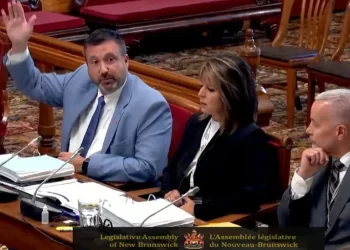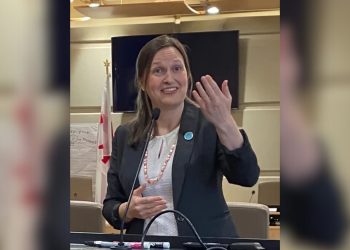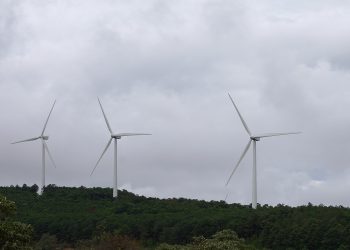On June 26, the federal government ended the Environmental Assessment of a proposed radioactive waste storage facility beside Lake Huron, after Ontario Power Generation (OPG) withdrew its proposal to build it. OPG decided to terminate the project after the Saugeen Ojibway Nation, on whose unceded territory the facility would be located, voted on January 31 not to support the project, which had been under consideration for 15 years.
What to do with radioactive waste remains a significant challenge for all nuclear reactor operators, including the two new nuclear projects currently supported by NB Power and the New Brunswick government. Recently, more than 100 groups across Canada, including nine in New Brunswick, signed a letter to the federal minister of Natural Resources asking to suspend all decisions about radioactive waste disposal until Canada has a sufficient radioactive waste policy in place.
In November 2019, a special mission of experts from the International Atomic Energy Agency (IAEA) recommended that Canada’s radioactive waste policy needed to be enhanced and that a national strategy on dealing with radioactive waste needed to be formulated. Canada has agreed to act on the IAEA recommendation.
Nuclear energy produces dangerous irradiated nuclear fuel and a host of other radioactive waste materials requiring safe storage for hundreds of thousands of years. Globally, no facility for permanent safe storage of irradiated fuel has been licensed to operate, and several facilities for storing non-fuel radioactive wastes have experienced setbacks costing billions of dollars to rectify.
In New Brunswick, the proposed new reactors (so-called “small modular nuclear reactors” or SMNRs) will create irradiated fuel even more intensely radioactive per kilogram than waste currently stored at NB Power’s Point Lepreau Nuclear Generating Station. The non-fuel radioactive wastes will remain the responsibility of the government of New Brunswick, likely requiring the siting of a permanent radioactive waste repository somewhere in the province.
The two New Brunswick prototypes are both designed to re-use spent CANDU fuel bundles. At Point Lepreau, solid highly radioactive used fuel bundles are stored in hundreds of silos on a site about a kilometre away from the CANDU reactor.
Interestingly, promoters of both new nuclear projects in New Brunswick – the ARC-100 reactor and the Moltex “Stable Salt Reactor” – claim their reactors will “burn up” these radioactive waste fuel bundles. They have even suggested that their prototype reactors offer a “solution” to the Lepreau’s existing nuclear fuel waste problem. This is untrue. Radioactive left-over used fuel from the new reactors will still require safe storage for hundreds of thousands of years.
The only way to re-use the existing used nuclear fuel at Lepreau is to access the unused “fissile material,” mainly plutonium, contained in the irradiated fuel bundles. This process would revive fears of a “plutonium economy,” a civilian traffic in special nuclear materials that governments or criminals or terrorists can use to make powerful nuclear weapons or radiological explosives called “dirty bombs” without the need for sophisticated or readily detectable infrastructure.
The basic problem is that you cannot access the materials inside the spent fuel from Lepreau except by opening up the solid bundles and converting them into a molten or liquid form. The spent fuel contains hundreds of human-made radioactive poisons that were created inside the Lepreau nuclear reactor. Some of these poisons are gasses or vapours, making it extremely difficult to keep all dangerous materials in check and accounted for. In prior operations of this kind, radioactive pollutants have invariably escaped into the environment.
Until now, every effort to recycle and “burn up” used reactor fuel – in France, the UK, Russia and the US – has resulted in countless incidents of radioactive contamination of the local environment. In addition, none of these projects eliminated the need for permanent storage of the left-over long-lived radioactive byproducts, many of which cannot be “burned up.”
When recycled plutonium and enriched uranium are used as fuels in a Moltex SSR or ARC-100 reactor, an even greater concentration of intensely radioactive fission products will be produced —more so than already exists from the Lepreau reactor, which uses unenriched uranium as fuel. If the two new reactors are built, for the first 500 to 1,000 years after they go into operation, the used fuel from them will be much more radioactive per kilogram than the used fuel from Lepreau.
The nuclear waste problem is not going away. The recent letter from more than 100 groups across Canada, and the cancellation last week of the proposed nuclear waste dump in Ontario have shown that significant opposition to new nuclear energy generation exists. Because producing nuclear energy always means producing nuclear waste as well.
In New Brunswick, a new group, the Coalition for Responsible Energy Development in New Brunswick (CRED-NB), focusing on nuclear-free renewable energy in the province, was launched in May. On their website, the group states it is providing information that the new nuclear project proponents, NB Power and the New Brunswick government, have not included in their promotional materials.
Read all of the NB Media Co-op stories about the proposed nuclear reactors for New Brunswick, here.
Dr. Gordon Edwards, a scientist and nuclear consultant, is the President of the Canadian Coalition for Nuclear Responsibility. Dr. Susan O’Donnell, a former senior research officer at the National Research Council of Canada, is the lead researcher on the University of New Brunswick’s RAVEN project that is a member of CRED-NB. Susan is on the NB Media Co-op editorial board.



![Radioactivity and nuclear waste under scrutiny in Peskotomuhkati homeland [video]](https://nbmediacoop.org/wp-content/uploads/2025/10/EdwardsAkagiOct52025-1-350x250.jpg)


![‘Continuum of genocide’: Pentagon funding of Sisson mine provokes renewed opposition from Wolastoq Elders [video]](https://nbmediacoop.org/wp-content/uploads/2025/07/SissonMine-2-120x86.jpg)



